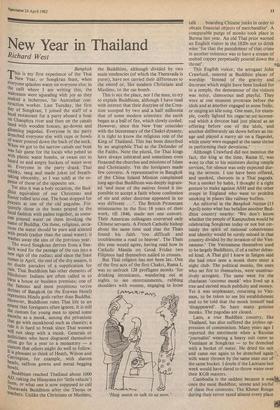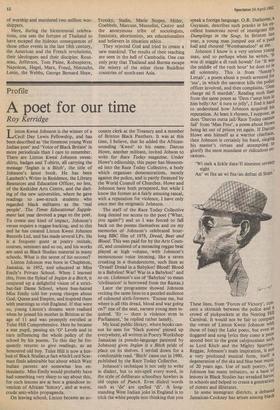New Year in Thailand
Richard West
Bangkok This is my first experience of the Thai New Year, or Songkran feast, when everyone splashes water on everyone else; in the cafe where I am writing this, the waitresses were squealing with joy as they soaked a lecherous, fat Australian con- struction worker. Last Tuesday, the first day of Songkran, I joined the staff of a local restaurant for a party aboard a boat 0.111 Chaophya river and then on the canals ivied with wooden houses, go-downs and gleaming pagodas. Everyone in the party drenched everyone else with cups or bowls of water poured down the back of the neck. When we got to the narrow canals our boat was fair game for the locals who pelted us with plastic water bombs, or swam out to board us and empty buckets of water over Us- Everyone in the party drank Thai Whisky, sang and made jokes (of breath- taking obscenity, so I was told) at the ex- Pense of those of the opposite sex. Yet also it was a holy occasion, the Bud- dhist equivalent of our Christmas and Easter rolled into one. The boat stopped for Prayers at one of the old pagodas. Fre- quently those in the boats prayed in the local fashion with palms together, as some- One Poured water on them invoking the name of Buddha. On these, religious, occa- sions the water should be pure and scented with petals (rather than the canal water); it Washes away the sins of the previous year. The word Songkran derives from a San- skrit word for the passage of the sun into a new sign of the zodiac; and since the feast comes in April, the end of the dry season, it no doubt partakes of a supplication for rain. Thai Buddhism has other elements of Hinduism: Indians are often called in to bless a house or business premises; one of the famous and most propitious volve shrines of Bangkok (at the Erawan Hotel) represents Hindu gods rather than Buddha. However, Buddhism rules Thai life to an extent that foreigners often ignore. It is still the custom for young men to spend some months as a monk, among the privations that go with monkhood such as chastity; a rule it is hard to break since Thai women Will not sleep with a monk. Generals or Politicians who have disgraced themselves often go for a year to a monastery — a custom that others might do well to follow. It Is Pleasant to think of Heath, Wilson and Carrington, for example, with shaven heads, saffron gowns and metal begging Lloyds.
Buddhism reached Thailand about 1000 taking the Hinayana (or 'little vehicle') form, or what one is now supposed to call Theravada Buddhism after the Theras or teachers. Unlike the Christians or Muslims,
the Buddhists, although divided by two main tendencies (of which the Theravada is purer), have not carried their differences to the sword or, like modern Christians and Muslims, to the car-bomb.
This is not the place, nor 1 the man, to try to explain Buddhism, although I have read with interest that their doctrine of the Crea- tion scooped by two and a half millennia that of some modern scientists: the earth began as a ball of fire, which slowly cooled. However, since this New Year coincides with the bicentenary of the Chakri dynasty, it is right to know the religious role of the King of Thailand. This has been described by an anglophile Thai as the Defender of the Faiths. Note the plural, for Thai kings have always tolerated and sometimes even financed the churches and missions of Islam and Christianity. Yet the foreigners made few converts. A representative in Bangkok of the China Inland Mission complained long ago that Buddhism was deeply ingrain- ed 'and most of the natives found it im- possible to accept a faith whose confession of sin and other doctrine appeared in no way different The British Protestant missionaries in the first 18 years of their work, till 1846, made not one convert. Their American colleagues converted only Chinese servants. A French Catholic bishop about the same time said that the Thais found his faith 'too difficult and troublesome a road to heaven'. The Thais this year would agree, having read how in Catholic Manila on Good Friday two Filipinos had themselves nailed to crosses.
But Thai religion has not been lax. One of the first acts of the first Chakri, Rama I, was to unfrock 128 profligate monks 'for drinking intoxicants, wandering out at nights to see entertainments, rubbing shoulders with women, engaging in loose
'Haig wants to talk to us now.'
talk boarding Chinese junks in order to obtain financial objects of merchandise'. A comparable purge of monks took place in Burma last year. An old Thai prior warned an English visitor in the 1820s not to drink wine 'for that the punishment of that crime in another existence was to have a stream of melted copper perpetually poured down the
throat'. ora
This English visitor, the arrogant John Crawfurd, sneered at Buddhist places of worship: 'Instead of the gravity and decorum which might have been looked for in a temple, the demeanour of the visitors was noisy, clamorous and playful. They were at one moment prostrate before the idols and at another engaged in some frolic, or singing an idle song. One man, for exam- ple, coolly lighted his cegar lati anl incense- rod which a devotee had just placed as an offering before one of the idols, and another deliberately sat down before an im- age and played a merry air on a flageolet, while many were engaged at the same shrine in performing their devotions.'
Although Crawfurd did not mention the fact, the king at the time, Rama II, was wont to chat to his ministers during temple services, for silence was only expected dur- ing the sermon. I too have been offered, and smoked, cheroots in a Thai pagoda. Not a smoker by habit, I thought it a right gesture to make against ASH and the other creeps in England who want to prohibit smoking in places like railway buffets.
An editorial in the Bangkok Nation (13 April) notes what has befallen another Bud- dhist country nearby: 'We don't know whether the people of Kampuchea would be celebrating Songkran today or not but cer- tainly the spirit of national cohesiveness and identity would be sorely missed in that country divided by the invasion of the Viet- namese.' The Vietnamese themselves used to be largely Buddhists, if of a rather debas- ed kind. A Thai girl I knew in Saigon said she had once seen a monk there enter a night club. The political monks, the ones who set fire to themselves, were unattrac- tively arrogant. The same went for the charlatan 'coconut monk' who lived up a tree and earned much publicity and money. Yet it was unpleasant, returning to Viet- nam, to be taken to see his establishment and to be told that the monk himself had `disappeared'. So have many genuine monks. The pagodas are closed.
Laos, a true Buddhist country, like Thailand, has also suffered the joyless op- pression of communism. Many years ago I reported the merriment when a Russian `journalist' wearing a heavy suit came to Vientiane at Songkran — to be drenched with a bucket of water. He dried his suit and came out again to be drenched again ti with water thrown by the same man out of the same bucket. I doubt if the Laotians last week would have dared to throw water over their KGB masters.
Cambodia is the saddest because it w once the most Buddhist, serene and joyful of these five countries. The Khmer Rouge during their terror razed almost every place of worship and murdered two million wor- shippers.
Here, during the bicentennial celebra- tions, one sees the fortune of Thailand to have escaped the hideous consequences of those other events in the late 18th century, the American and the French revolutions, their ideologues and their disciples: Rous- seau, Jefferson, Tom Paine, Robespierre, Napoleon, Hegel, Marx, Freud, Nietzsche, Lenin, the Webbs, George Bernard Shaw, Trotsky, Stalin, Marie Stopes, Hitler, Goebbels, Marcuse, Mussolini, Castro and the anonymous tribe of sociologists, feminists, abortionists, sex educationalists and believers in situation ethics.
They rejected God and tried to create a new mankind. The results of their teaching are seen in the hell of Cambodia. One can only pray that Thailand and Burma escape the misery of the other three Buddhist countries of south-east Asia.







































 Previous page
Previous page